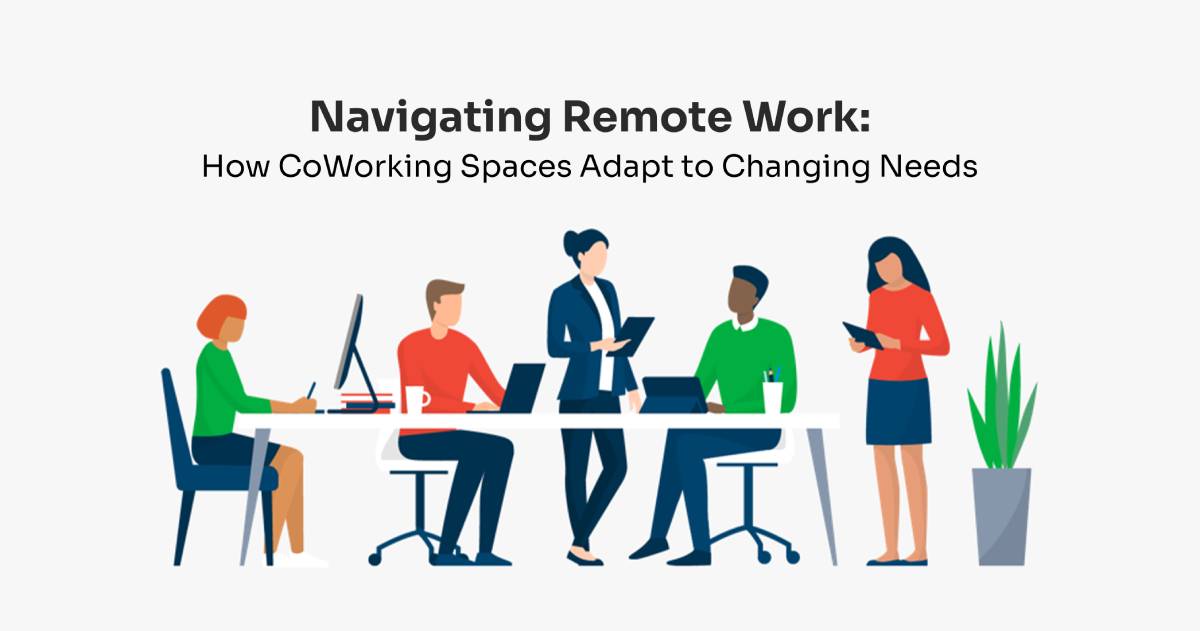In the era of remote work dominance, coworking spaces have emerged as dynamic hubs that not only help in accommodation but actively embrace the evolving needs of professionals. The transformation of traditional work structures has propelled coworking spaces into a central role, providing agile solutions for the challenges and opportunities presented by remote work. This exploration delves into the ways coworking spaces navigate the remote work landscape, offering insights into their adaptability, technology integration, and community-driven approaches.
1. Adaptability and Flexibility:
The cornerstone of coworking spaces’ success in navigating remote work lies in their inherent adaptability and flexibility. These spaces, crafted to cater to the diverse needs of professionals, offer a wide range of work environments, from private offices to communal areas, enabling individuals and teams to choose the setting that best suits their work style.
The ability to seamlessly adapt to changing circumstances, whether it is an increase in remote work or a shift in workspace preferences and locations, clearly positions the coworking spaces as agile solutions for the modern workforce. Their commitment to flexibility allows professionals to blend remote work with in-person collaboration, creating a harmonious balance that caters to the ebb and flow of work dynamics.
2. Technology Integration:
Coworking spaces have become pioneers in integrating cutting-edge technology to facilitate remote work effectively. High-speed internet, video conferencing facilities, and smart building management systems are standard offerings. These technological amenities ensure that professionals working from coworking spaces experience a seamless transition between virtual and physical collaboration.
Automated booking systems and digital collaboration tools enhance the efficiency of coworking spaces, providing a tech-savvy environment that aligns with the demands of remote work. The integration of such technologies not only improves the functionality of the space but also positions coworking hubs as modern work ecosystems that leverage innovation for the benefit of their members.
3. Community-Driven Collaboration:
A key aspect that sets coworking spaces apart in the realm of remote work is their emphasis on community-driven collaboration. These spaces go beyond providing a physical workspace; they foster a sense of belonging and connection among their members. Networking events, skill-sharing sessions, and collaborative initiatives create an environment where professionals can engage, exchange ideas, and find support.
The community-driven approach addresses the potential isolation that can accompany remote work. Coworking spaces act as catalysts for meaningful connections, sparking collaborations and partnerships that extend beyond the physical workspace. This sense of community becomes a valuable asset, offering professionals a support system that transcends geographical boundaries.
4. Hybrid Work Solutions:
By recognizing the shift towards hybrid work models, coworking spaces are strategically positioning themselves as essential components of this new paradigm. The effortless blending of remote work, in-person collaboration, and accessibility of a flexible office environment positions coworking spaces as ideal solutions for individuals and organizations navigating the complexities of hybrid work arrangements.
By offering memberships that provide access to multiple locations or on-demand office space, coworking spaces cater to the diverse needs of professionals who seek a balance between the autonomy of remote work and the benefits of a physical workspace. This adaptability to hybrid models is indicative of coworking spaces’ commitment to providing solutions that align with the evolving nature of work.
5. Enhanced Well-Being Initiatives:
In response to the growing recognition of the importance of well-being in the workplace, coworking spaces are prioritizing initiatives that support the physical and mental health of their members. Fitness facilities, wellness programs, and dedicated spaces for relaxation contribute to an environment that goes beyond traditional workspaces.
The focus on well-being aligns with the broader shift towards a holistic approach to work. Coworking spaces recognize that remote work can blur the lines between professional and personal life, and initiatives supporting well-being act as a counterbalance, ensuring that professionals can thrive in both aspects of their lives.
6. Industry-Specific Tailoring:
To further cater to the diverse needs of professionals engaged in remote work, coworking spaces are increasingly tailoring their offerings to specific industries. Tech-focused coworking hubs, creative spaces, and industry-specific communities provide targeted environments that enhance collaboration and innovation within those sectors.
By understanding the unique requirements of different industries, coworking spaces create ecosystems that align with the specific challenges and opportunities faced by professionals in those fields. This industry-specific tailoring is a testament to adaptability and customization capabilities of coworking spaces.
7. Resilience in Uncertain Times:
The COVID-19 pandemic underscored the importance of resilience in the business landscape, and coworking spaces demonstrated their ability to navigate uncertainty. While the pandemic initially raised questions about the future of shared workspaces, coworking operators showcased their adaptability by implementing health and safety measures, enhancing digital offerings, and continuing to provide a secure and productive work environment.
The resilience of coworking spaces during challenging times reinforces their role as integral components of the modern work ecosystem. As professionals seek stability and flexibility in their work arrangements, coworking spaces have proven to be reliable partners in navigating uncertainty.
Coworking spaces are not just adapting to the era of remote work; they actively shape its trajectory. Their adaptability, technology integration, community-driven approach, and commitment to well-being position them as key players in the future of work. As professionals continue to navigate the complexities of remote work, coworking spaces stand as versatile solutions that provide the flexibility, connectivity, and support needed for success in the ever-evolving landscape of work.

